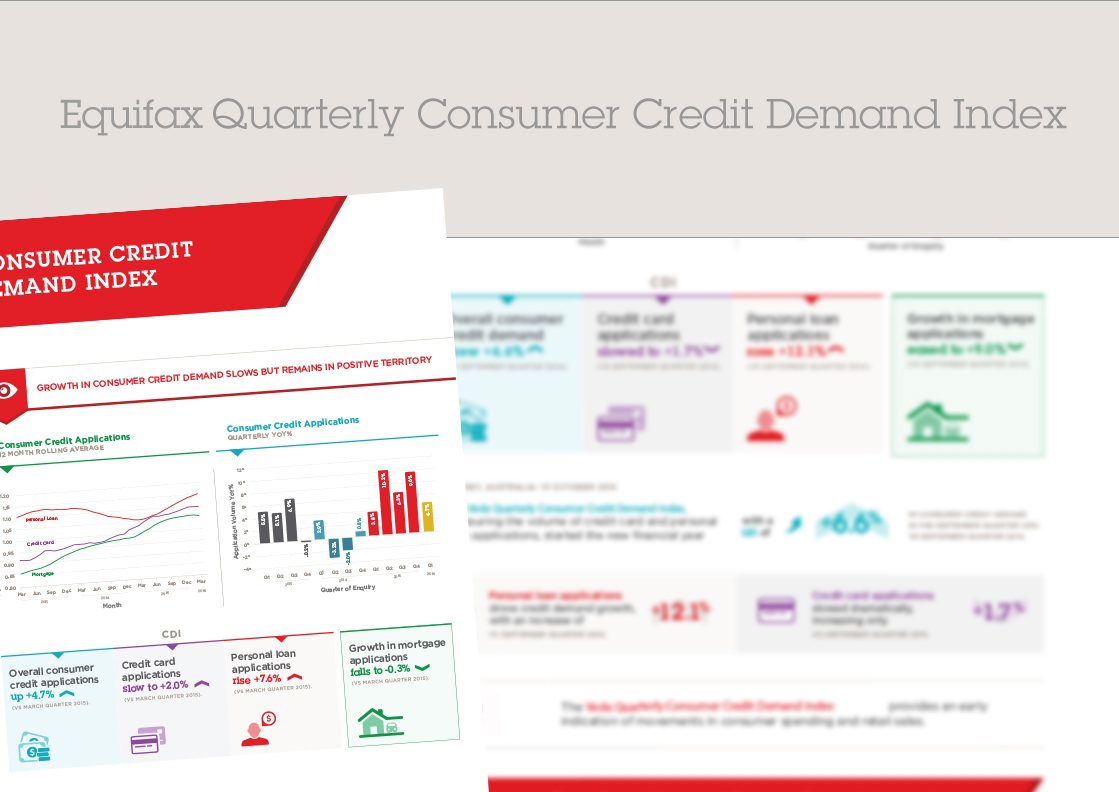Consumer credit demand still soft but mortgage enquiries rise

Veda Quarterly Business Credit Demand Index: March 2012
- Overall consumer credit demand down by 4.8% year on year.
- Credit card applications down by 8%
- Personal loan applications decline by 1.4% but strong lift in Western Australia.
- Mortgage enquiries increase of 1.5%, the first rise in eight quarters.
Sydney, Australia: 24 April 2012: The results of Equifax's Consumer Credit Demand Index for the first quarter of 2012 show a continued decline in consumer credit demand year on year but also the first increase in mortgage enquiries since 2009. Veda is Asia Pacific's leading provider of commercial and consumer data intelligence and insights.
Mortgage enquiries increased for the first time in eight quarters, increasing by 1.5% year on year. Year on year mortgage enquiries showed a solid increase in QLD (10.2%), NT (9.7%) and WA 6.6%) which indicates that mortgage enquiries may be stabilising.
Mortgage enquiries in NSW dropped sharply (-7.6%) in the March quarter when compared to the December 2011 quarter, a reflection of the expiration of stamp duty exemptions in NSW at the end of last year which resulted in a pull forward of first home buyer demand followed by a drop in the first quarter of 2012.
"Turning points in mortgage enquiries usually occur one to three quarters ahead of turning points in house prices, an early warning sign which could indicate that after a continued decline, mortgage enquiries may have bottomed out. Veda mortgage enquiries are closely related to the number of housing finance approvals so this is a trend to watch, particularly if you are hoping for a future pick-up in house prices," Mr Luffman commented.
"In terms of state by state mortgage activity we are seeing different trends play out with NSW mortgage enquiries being affected by the expiration of stamp duty and Queenslanders starting to bounce back after a challenging year," Mr Luffman added.
Credit Card applications declined sharply in SA (-12%), NSW (-11.3%) and Victoria (-8.8%) over the last year while the decline is less severe in Queensland (-1.6%) and WA (-4.2%). In part, the weakness in credit card applications reflects the rise in the use of debit cards and the introduction of responsible lending laws in 2011, which has led to more steps being added to credit card application processes.
Personal loan applications decreased 1.4% year on year with reduced demand in all states in the March quarter with the exception of for WA and ACT. In sharp contrast to other states, personal loan applications surged in WA (+8.3%) year on year while weakness in personal loan applications was particularly evident in TAS (-7%), NSW (-4.4%) and SA (-3.4%).
"Australian households have spent the post-GFC period firmly in saving rather than spending mode and the results show that consumers are still cautious about taking on credit, " said Mr Luffman.
"While applications for credit cards and personal loans have both declined, the reduction in card applications is far greater, showing that they are increasingly falling out of favour with consumers as households continue to focus on saving. However, the results indicate that Australia's two-speed economy is still in effect with consumer credit demand significantly stronger in the mining states," Mr Luffman added.
Compiled by Veda since 2004, the Consumer Credit Demand Index is a quarterly analysis of changes in consumer demand for credit cards, personal loans and mortgages across Australia.
